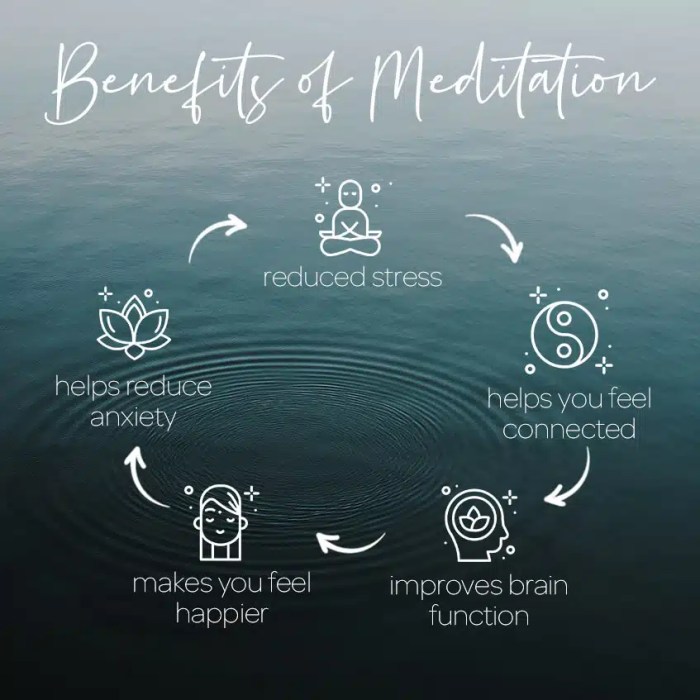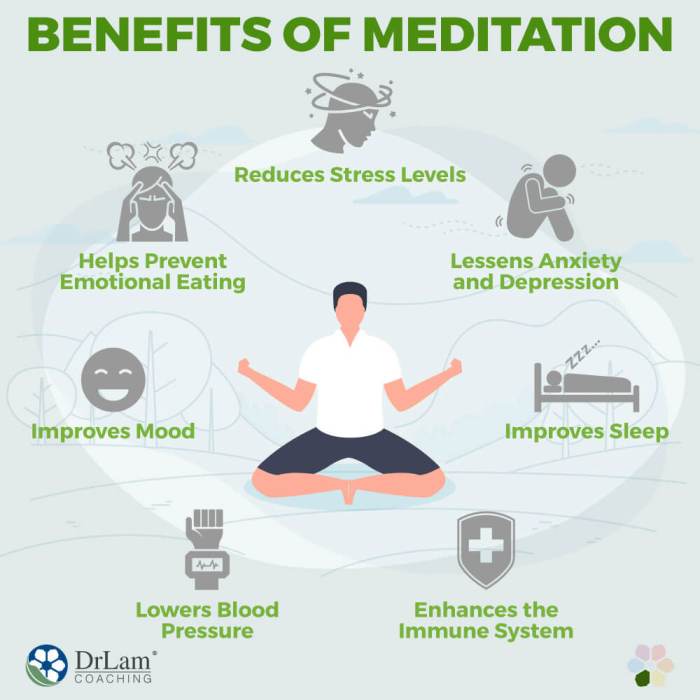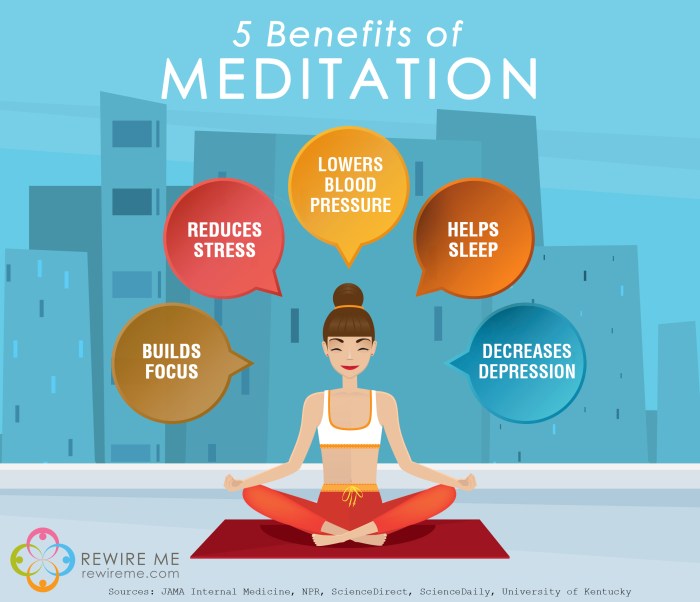Embark on a journey of self-discovery and profound transformation with the enlightening exploration of the 12 Benefits of Practicing Meditation Regularly. Delve into the realms of physical, mental, spiritual, cognitive, social, and productivity benefits that await you on this sacred path of meditation.
Uncover the secrets of meditation as a powerful tool for holistic well-being and personal growth, paving the way for a harmonious and balanced life filled with peace and joy.
Introduction to Meditation
Meditation is a practice that involves focusing the mind and achieving a state of deep relaxation and awareness. It has been around for thousands of years and is often associated with spiritual or religious traditions.
The origins of meditation practices can be traced back to ancient civilizations in India, China, and other parts of the world. These practices were initially developed as a way to cultivate inner peace, spiritual growth, and enlightenment.
Types of Meditation Techniques
- Mindfulness Meditation: Involves focusing on the present moment and observing thoughts and sensations without judgment.
- Transcendental Meditation: Involves repeating a mantra to achieve a state of relaxed awareness.
- Loving-Kindness Meditation: Focuses on cultivating feelings of love and compassion towards oneself and others.
- Yoga Meditation: Combines physical postures, breath control, and meditation to promote overall well-being.
Common Misconceptions about Meditation
-
Meditation is only for spiritual or religious people.
-While meditation has roots in spiritual practices, it can be beneficial for people of all backgrounds and beliefs.
-
You have to clear your mind completely to meditate.
-It’s normal for thoughts to come and go during meditation; the goal is to observe them without getting attached.
-
Meditation is a quick fix for all problems.
-While meditation can have numerous benefits, it’s not a cure-all and requires consistent practice.
Physical Benefits of Regular Meditation

Meditation offers a wide range of physical health benefits that can significantly improve overall well-being. One of the key advantages of regular meditation is its ability to reduce stress levels, which in turn can have a positive impact on various aspects of physical health.
Stress Reduction
- Meditation helps to activate the body’s relaxation response, leading to a decrease in the production of stress hormones like cortisol.
- Regular practice can lower blood pressure, reduce inflammation, and boost the immune system, all of which are linked to chronic stress.
- By calming the mind and promoting a sense of inner peace, meditation can alleviate symptoms of anxiety and depression, further reducing stress levels.
Improved Sleep Quality
- Practicing meditation before bedtime can help relax the body and mind, making it easier to fall asleep and improving the quality of sleep.
- Individuals who meditate regularly often experience deeper and more restful sleep, waking up feeling refreshed and energized.
- By reducing stress and anxiety, meditation can address common sleep disorders like insomnia, promoting a healthier sleep pattern.
Mental Health Benefits of Regular Meditation

Meditation is not only beneficial for physical health but also plays a crucial role in improving mental well-being. Regular meditation practice can have a positive impact on various aspects of mental health, including managing anxiety and depression, enhancing focus and concentration, and promoting emotional stability.
Anxiety and Depression Management, 12 Benefits of Practicing Meditation Regularly
- Meditation has been shown to reduce symptoms of anxiety and depression by calming the mind and promoting relaxation.
- Regular meditation practice can help individuals develop a sense of inner peace and mindfulness, which can alleviate stress and negative emotions.
- By cultivating a deep sense of awareness and acceptance, meditation enables individuals to better cope with challenging emotions and thoughts.
Improved Focus and Concentration
- Meditation involves training the mind to focus on the present moment, which can enhance cognitive functions such as attention and concentration.
- Through mindfulness practices, individuals can learn to direct their attention to specific tasks or activities, leading to improved productivity and mental clarity.
- Regular meditation can also reduce distractibility and enhance the ability to sustain attention on a single object or thought.
Promotion of Emotional Stability
- By fostering a sense of inner peace and equanimity, meditation can help individuals regulate their emotions and respond to challenging situations with greater resilience.
- Practicing meditation regularly can increase emotional intelligence and awareness, leading to more balanced and stable emotional responses.
- Through mindfulness techniques, individuals can develop a deeper understanding of their emotions and cultivate positive mental states such as compassion and empathy.
Spiritual Benefits of Regular Meditation

Meditation not only has physical and mental health benefits but also plays a significant role in enhancing one’s spiritual well-being. By incorporating meditation into your daily routine, you can experience profound spiritual benefits that can enrich your life in various ways.
Deepening Spiritual Connection
Meditation allows individuals to connect with their inner selves and tap into a higher state of consciousness. By quieting the mind and focusing inward, practitioners can cultivate a deeper connection with their spiritual essence. This heightened awareness can lead to a greater sense of purpose and meaning in life.
Impact on Mindfulness and Presence
Through regular meditation practice, individuals can develop mindfulness and presence in the present moment. This state of heightened awareness enables practitioners to fully engage with their surroundings and experiences without judgment or attachment. By staying present and mindful, individuals can deepen their spiritual connection and appreciate the beauty of life.
Greater Self-Awareness
Meditation helps individuals become more self-aware by encouraging introspection and reflection. By observing their thoughts, emotions, and reactions without judgment, practitioners can gain insight into their true selves. This increased self-awareness can lead to personal growth, self-acceptance, and a deeper understanding of one’s spiritual path.
Cognitive Benefits of Regular Meditation
Practicing meditation regularly can offer numerous cognitive benefits that can significantly improve overall brain function and mental clarity.
Enhanced Memory and Cognitive Function
- Regular meditation has been shown to enhance memory retention and improve cognitive function by reducing stress and promoting relaxation.
- Meditation helps in increasing focus and attention span, which in turn can lead to better memory recall and overall cognitive abilities.
- Studies have shown that individuals who meditate regularly have better cognitive skills and are able to process information more effectively.
Impact on Creativity and Problem-Solving Skills
- Meditation can boost creativity by calming the mind and allowing for new ideas to flow freely without judgment or distractions.
- By promoting a clear and focused mindset, meditation can help individuals approach problem-solving tasks with a fresh perspective and innovative solutions.
- Regular practice of meditation has been linked to improved critical thinking skills and the ability to think outside the box when faced with challenges.
Improvement in Decision-Making Abilities
- Through regular meditation, individuals can develop greater self-awareness and emotional regulation, which are essential components for making informed and rational decisions.
- Meditation helps in reducing impulsive behavior and allows individuals to approach decision-making with a calm and balanced mindset.
- By cultivating mindfulness through meditation, individuals can make better decisions that align with their values and long-term goals.
Social Benefits of Regular Meditation: 12 Benefits Of Practicing Meditation Regularly

Regular meditation practice can have a profound impact on our social interactions and relationships with others. By cultivating mindfulness and self-awareness, meditation can lead to improved empathy, compassion, communication skills, and a greater sense of community and connection with those around us.
Enhanced Empathy and Compassion
Meditation plays a crucial role in enhancing empathy and compassion towards others. Through mindfulness practices, individuals can develop a deeper understanding of the emotions and experiences of those around them. This increased empathy can lead to more meaningful and fulfilling relationships with friends, family, and even strangers.
Improved Communication Skills
Meditation can also have a positive impact on communication skills. By fostering present-moment awareness and emotional regulation, individuals who meditate regularly are better equipped to listen actively, express themselves clearly, and engage in more authentic and empathetic communication with others. This can lead to more harmonious and effective interactions in both personal and professional settings.
Fostering a Sense of Community and Connection
One of the social benefits of regular meditation is the ability to foster a sense of community and connection with others. As individuals deepen their self-awareness and cultivate compassion through meditation, they are more likely to seek out opportunities to connect with like-minded individuals and contribute positively to their communities. This sense of belonging and connection can lead to increased feelings of happiness and fulfillment in social interactions and relationships.
Productivity Benefits of Regular Meditation
Regular meditation practice can significantly enhance productivity in various aspects of life. By incorporating meditation into your daily routine, you can experience the following benefits:
Boosts Focus and Efficiency
- Meditation helps in improving focus and concentration, allowing you to complete tasks more efficiently.
- Enhanced mental clarity from meditation enables you to prioritize tasks effectively and stay organized.
Improves Time Management and Prioritization
- Through regular meditation, you can develop a better sense of time awareness and allocate your time wisely.
- Increased mindfulness from meditation practice helps you identify priorities and allocate time accordingly.
Reduces Procrastination
- Meditation assists in reducing procrastination by cultivating discipline and self-control.
- By creating a habit of mindfulness through meditation, you can overcome the urge to procrastinate and tackle tasks promptly.
Enhances Cognitive Function
- Improved cognitive function resulting from meditation can lead to better decision-making and problem-solving skills.
- Clarity of mind attained through meditation allows for faster processing of information and increased creativity.
Physical Exercises to Complement Meditation

Practicing physical exercises alongside meditation can significantly enhance your overall well-being. The combination of movement and mindfulness can have a synergistic effect on your physical and mental health, leading to improved focus, relaxation, and inner peace.
Yoga
Yoga is a popular physical activity that complements meditation routines perfectly. It involves a series of poses, breathing exercises, and meditation techniques that promote flexibility, strength, and mindfulness. By incorporating yoga into your meditation practice, you can deepen your mind-body connection and cultivate a sense of balance and harmony.
Tai Chi
Tai Chi is a gentle form of martial arts that focuses on slow, flowing movements and deep breathing. This practice helps improve balance, flexibility, and relaxation while promoting mindfulness and stress reduction. Combining Tai Chi with meditation can enhance your mental clarity, emotional well-being, and physical health.
Qigong
Qigong is a Chinese mind-body practice that involves coordinated movements, breath control, and meditation. It aims to cultivate and balance the body’s vital energy, known as “qi” or “chi.” By integrating Qigong exercises into your meditation routine, you can enhance your overall vitality, reduce stress, and increase your sense of well-being.
Outcome Summary
As we conclude this exploration of the 12 Benefits of Practicing Meditation Regularly, remember that the profound impact of meditation transcends mere words. Embrace the transformative power of this practice and let it illuminate your path towards inner peace, spiritual awakening, and a life of fulfillment.